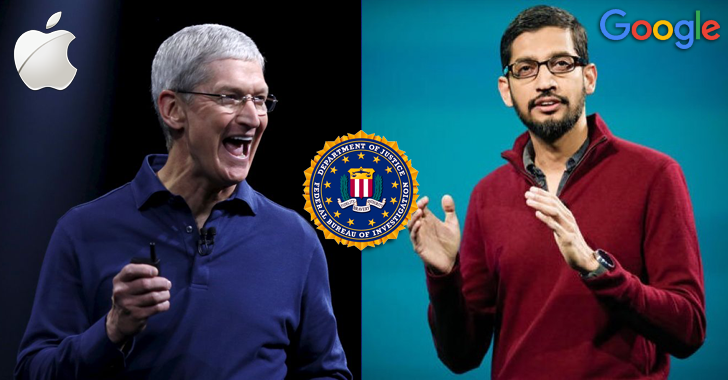In the escalating battle between the Federal Bureau of Investigation (FBI) and Apple over iPhone encryption, former National Security Agency (NSA) contractor Edward Snowden and Google chief executive Sundar Pichai just sided with Apple’s refusal to unlock iPhone.
Yesterday, Apple CEO Tim Cook refused to comply with a federal court order to help the FBI unlock an iPhone owned by one of the terrorists in the mass shootings in San Bernardino, California, in December.
Here’s What the FBI is Demanding:
The federal officials have asked Apple to make a less secure version of its iOS that can be used by the officials to brute force the 4-6 digits passcode on the dead shooter’s iPhone without getting the device’s data self-destructed.
Cook called the court order a
“chilling” demand that
“would undermine the very freedoms and liberty our government is meant to protect.” He argued that to help the FBI unlock the iPhone would basically providing an
Encryption Backdoor that would make the products less secure.
Backdoor for Government, Backdoor for All
However, Apple is worried that once this backdoor gets created and handed over to the FBI, there would be chances that the backdoor will likely get into the hands of malicious hackers who could use it for evil purposes.
Although many politicians, including Donald Trump, have slammed Apple’s decision, Google has stepped up and taken a public stand in support of Apple’s decision.
“I agree 100 percent with the courts,” Trump said in a statement. “But to think that Apple won’t allow us to get into her cell phone, who do they think they are? No, we have to open it up.”
In a series of tweets late Wednesday, Pichai sided with Apple while saying “forcing companies to enable hacking could compromise users’ privacy” and “requiring companies to enable hacking of customer devices & data. Could be a troubling precedent.”
However, Pichai took more than 12 hours to talk about this burning issue, after Edward Snowden pointed out that Google had not yet stepped forward to speak up on his stand.
“The @FBI is creating a world where citizens rely on #Apple to defend their rights, rather than the other way around,” Snowden tweeted on Wednesday. Snowden called on Google to stand with Apple, saying, “This is the most important tech case in a decade.”
Pichai’s stance is basically:
The technology companies will give its customers’ data to law enforcement when it is required to, but the companies will not put in a “Backdoor” for the government.
While the statements made by Pichai is not quite as forceful as Cook’s statement published in an open letter to its customers, we can assume both Google and Apple are together, at least in the sense that the federal agencies are asking too much.
![]()

